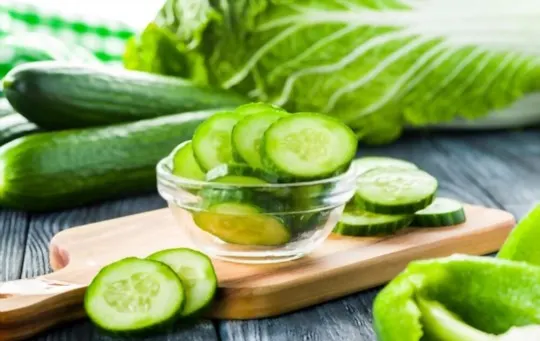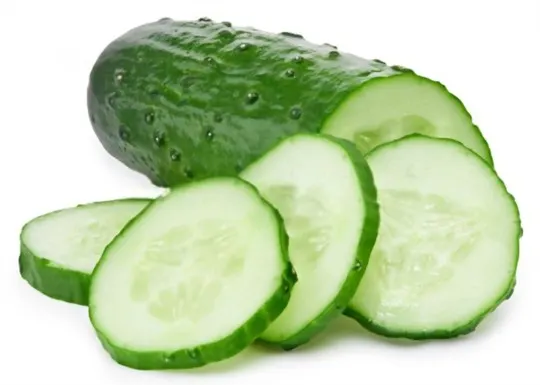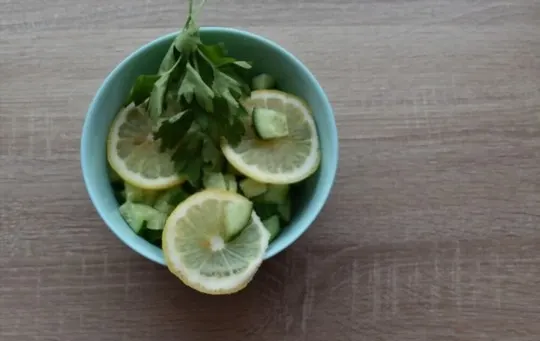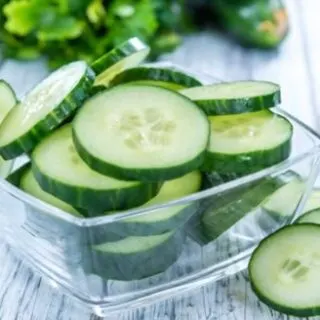Do you find yourself wondering: How long do cucumbers last?
Can they go bad? Well, these are two important questions to ask when planning your meals.
Cucumbers can be an incredibly versatile produce item that adds color and flavor to many recipes.
From salads and sandwiches to specialty sauces, it’s easy to see why their popularity is so widespread!
But how long do cucumbers keep for—and how soon should you eat them before they’re no longer good?
In this blog post, we’ll answer all of your questions about the shelf life of cucumbers (yay!).
We’ll also explore possible signs of spoilage in both sliced and stored cucumber pieces, brief storage tips, as well as delicious recipes with this simple yet refreshing vegetable.
So read on if you’re interested in learning more about the longevity of a humble yet valuable member of the veggie family–the much-loved cucumber!
What is Cucumber?

Cucumber is a refreshing vegetable that is often used in salads and as a garnish.
It is low in calories and contains a high water content, making it a great choice for people who are trying to lose weight or stay hydrated.
Cucumber is also a good source of vitamins C and K, as well as potassium and magnesium.
How to Store Cucumbers?
The best way to store cucumbers is in the fridge.
Place them in a plastic bag or container with holes in it so that they can breathe.
Cucumbers will last about two weeks stored this way.
If you need them to last longer, you can pickle them.
Pickling cucumbers is a great way to extend their shelf life and enjoy them for months.
How Long Do Cucumbers Last?

Cucumbers are a refreshing, healthy snack that can last for several days after being picked.
But how long do cucumbers actually last? And what is the best way to store them so they remain fresh?
Cucumbers typically last between 1-2 weeks when stored in a cool, dark place.
The ideal temperature for storing cucumbers is between 50-60 degrees Fahrenheit.
If stored at a higher temperature, cucumbers will become softer and more wrinkled.
To extend the shelf life of cucumbers, it’s important to keep them dry.
Moisture encourages the growth of mold and bacteria, which can cause cucumbers to rot.
Wrap cucumbers in a paper towel or clean cloth before placing them in the fridge, and check them periodically to make sure they’re not too wet.
If you want your cucumbers to last even longer, you can pickle them.
Pickling cucumbers is a great way to preserve their freshness and flavor.
There are many different ways to pickle cucumbers, so experiment until you find a method that you like.
Can You Freeze Cucumbers?

Cucumbers can be frozen, but it’s important to do it correctly in order to preserve their flavor and texture.
When freezing cucumbers, it’s best to slice them first and then blanch them in boiling water for two minutes.
After blanching, immediately place the cucumber slices in a bowl of ice water.
Once they’re cooled, drain them and then place them on a baking sheet lined with parchment paper.
Freeze the cucumbers for two hours, or until they’re solid.
Once they’re frozen, transfer them to a freezer-safe bag.
Cucumbers can last in the freezer for up to eight months.
When you’re ready to use them, thaw the cucumber slices in the refrigerator overnight.
Use them within a day or two for the best quality.
How To Tell If Cucumbers Are Bad?

The best way to tell if a cucumber is bad is by its appearance.
If the cucumber is wilted, has dark spots, or looks dull, it is probably bad and should be thrown out.
Another way to tell if a cucumber has gone bad is by smelling it.
If the cucumber smells sour or off, it is bad and should not be eaten.
Finally, if the cucumber is mushy or slimy, it is definitely bad and you should toss it in the garbage.
If you’re not sure whether or not a cucumber is bad, it’s always better to err on the side of caution and throw it out.
Eating a bad cucumber could make you sick, so it’s not worth taking the risk.
When in doubt, throw it out.
Conclusion
Cucumbers can last for up to two weeks when stored properly.
When storing cucumbers, be sure to keep them in a cool, dry place.
You can also extend their shelf life by wrapping them in a paper towel or placing them in a perforated bag.
Be sure to check them periodically for signs of spoilage, such as excessive wilting or browning.
If you notice any of these signs, it’s best to discard the cucumber.

How Long Do Cucumbers Last? Do They Go Bad?
Ingredients
- Cucumbers
- Air-tight containers or Ziplock bags
- Labels and markers
Instructions
- Store your product in an labelled container in a cool, dark place like the pantry or fridge.
- If your food is frozen, allow it to thaw in the fridge before cooking.
- Make sure to look for signs that your food has gone bad before eating it.

Carrie is a food writer and editor with more than 15 years of experience. She has worked for some of the biggest names in the food industry, including Bon Appétit, Food & Wine, and Martha Stewart Living.
As the Editor in Chief of IntroChicago.com, Carrie oversees all of the content on the site. She also manages the team of contributing writers and editors, who help to create delicious recipes, helpful tips, and informative articles that you’ll find on the site.
A native of the Chicago area, Carrie is passionate about all things food. She loves trying new restaurants and experimenting with new recipes in her kitchen. She’s also a graduate of the Culinary Institute of America, so she knows a thing or two about food!
